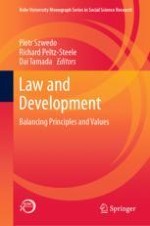2019 | OriginalPaper | Buchkapitel
8. Private-Sector Transparency as Development Imperative: An African Inspiration
verfasst von : Richard Peltz-Steele, Gaspar Kot
Erschienen in: Law and Development
Verlag: Springer Singapore
Aktivieren Sie unsere intelligente Suche, um passende Fachinhalte oder Patente zu finden.
Wählen Sie Textabschnitte aus um mit Künstlicher Intelligenz passenden Patente zu finden. powered by
Markieren Sie Textabschnitte, um KI-gestützt weitere passende Inhalte zu finden. powered by
